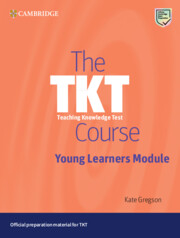Book contents
- Frontmatter
- Acknowledgements
- Contents
- Introduction
- Part 1 Knowledge of young learners and principles of teaching English to young learners
- Part 2 Planning and preparing young learner lessons
- Part 3 Teaching young learners
- Part 4 Assessing young learner learning in the classroom
- Follow-up activities: Answer keys and commentaries
- List of terms found in the TKT Glossary
- Glossary of TKT: Young Learners terms
- Test tips for TKT: Young Learners
- Teaching knowledge test young learners: Practice test
- Sample test answer sheet for TKT: YL practice test
- Answer key for TKT: YL practice test
Unit 12 - What to assess: What focuses do different types of classroom-based assessment have?
Published online by Cambridge University Press: 14 March 2024
- Frontmatter
- Acknowledgements
- Contents
- Introduction
- Part 1 Knowledge of young learners and principles of teaching English to young learners
- Part 2 Planning and preparing young learner lessons
- Part 3 Teaching young learners
- Part 4 Assessing young learner learning in the classroom
- Follow-up activities: Answer keys and commentaries
- List of terms found in the TKT Glossary
- Glossary of TKT: Young Learners terms
- Test tips for TKT: Young Learners
- Teaching knowledge test young learners: Practice test
- Sample test answer sheet for TKT: YL practice test
- Answer key for TKT: YL practice test
Summary
LEARNING OUTCOMES
By the end of this unit, you will…
KNOWLEDGE: be more aware of a range of focuses of classroom-based assessment
SKILLS: be able to select classroom-based assessment techniques appropriate to the focus of assessment
■ Starter Question
Before you begin this unit, read the starter question and make some notes. Then read the commentary and compare it to your notes.
What can teachers assess in the young learner English classroom? Think of more than one possible focus of assessment.
COMMENTARY
Teachers of English may well feel it is their role to assess their learners’ English – and it is, of course. However, we can and should assess more than just their English language in order to support the teaching and learning process.
Language and skills
We might want to assess learners’ achievement or progress in their use of language through speaking and writing activities, where we can see their productive skills or their understanding of language through receptive skills activities, that is reading and listening. We may also assess the subskills of any of these four main skills, such as listening for specific information, fluency, scanning, use of punctuation, and so on. Example: Playing a card matching game where learners match picture flashcards with their word card assesses vocabulary knowledge and reading at word level.
Learning strategies
Similarly, we can assess children's use of or progress in learning strategies. Giving constructive feedback on their learning strategies will help them become better, more independent learners and, therefore, drive their learning forwards. Many of these skills are transferable to other school subjects, so can support them in their broader education and learning as well.
Example: Reviewing and giving feedback on learners’ vocabulary notebooks or learner-made picture dictionaries assesses this learning strategy.
Cognitive strategies
These are strategies which involve the use of thinking skills. As with many learning strategies, effective use of cognitive strategies not only supports learners’ English language development, it also helps their development overall. We can assess and give feedback to learners on their use of such strategies or on their progress in them, and this allows them to develop further.
- Type
- Chapter
- Information
- The TKT Course Young Learners Module , pp. 126 - 135Publisher: Cambridge University PressPrint publication year: 2024

